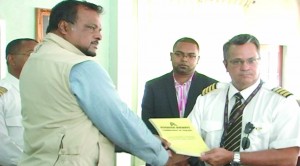The report of a Roraima Airways-commissioned investigation into the discovery of cocaine hidden in snacks for a Delta Airlines flight back in September found shortcomings in the handling process at the Cheddi Jagan International Airport. The findings of the private investigation were officially handed over to the company’s managing director, Captain Gerald Gouveia on Monday.





Comments are closed.